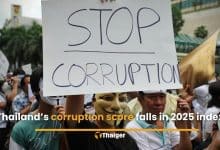South Korea aspires to become a global pivotal state for Indo-Pacific crisis response

South Korea‘s aim to become a global pivotal state (GPS) will help countries in the Indo-Pacific region address crises, according to the nation’s Deputy Foreign Minister, Choi Youngsam, who spoke to media in Seoul.
Choi addressed the World Journalist Conference, hosted by the Journalist Association of Korea from April 24-29. Around 50 international journalists, including five from Southeast Asia – Thailand, Cambodia, Laos, Indonesia, and Malaysia – were invited to the event.
His speech highlighted South Korea’s ambition to become a GPS by implementing the nation’s Indo-Pacific strategy, to expand global engagement.
Choi explained that South Korea’s GPS aspirations are based on freedom, democracy, human rights, and the rule of law.
He said that the Indo-Pacific strategy was introduced in December last year by South Korean President Yoon Suk-yeol, adding that it not only supports South Korea’s interests but also benefits the region.
Part of the strategy’s framework emphasizes working collaboratively with other countries to ensure peace in the Indo-Pacific, Choi said.
“I believe all of us here can agree on at least two things.
“First, we are living in a world of ‘polycrisis’ – the Covid-19 pandemic, climate change, global technological competition, supply chain disruption, and recently the Ukraine war. I think we are profoundly aware of it.
“Of course, North Korea’s proliferation of nuclear activities remains a direct threat to the region and beyond. Second, we are all aware we have to solve these challenges together because we are interconnected.
“In this context, Korea is seeking to have its own vision of a global pivotal state, or GPS. If you have Korea as your friend, you do not need to worry about where to go in the future.”
Choi said there are three principles within the Indo-Pacific strategy: inclusiveness, trust, and reciprocity.
Under these three principles, there are nine core ideas.
He listed them as establishing an Indo-Pacific regional order based on rules and shared norms, promoting the rule of law and human rights, strengthening non-proliferation and counterterrorism efforts, and enhancing comprehensive security cooperation.
These initiatives would also include the expansion of economic security networks, promoting cooperation in science and technology, and contributing to narrowing the digital divide, as well as leading regional cooperation on climate change and energy security.
Moreover, they include promoting tailored development cooperation partnerships and facilitating mutual understanding and exchanges. Choi said…
“We will neither target nor exclude any specific nation. We will work with any partner that shares our vision under the principle of cooperation. Our partnership will be imprinted with deep mutual trust.
“Trust is an integral part of our vision that addresses regional and global challenges together. And we will seek mutually beneficial cooperation for a prosperous Indo-Pacific region.
“South Korea has strived to maintain strong relations with various regions, including ASEAN.
“Within this strategy, Korea will work beyond the Korean peninsula and northeast Asia. For example, we will work closely with countries, and other regions, including ASEAN through the Korea-ASEAN Solidarity Initiative, or KAS for short.”
Choi said President Yoon informed the ASEAN-Korea Summit held in Phnom Penh last November that South Korea would aim to upgrade and elevate its partnership with ASEAN.
As part of this, South Korea would help strengthen political-security cooperation in addition to existing economic, social, and cultural cooperation initiatives.
He also mentioned that these initiatives would reinforce ASEAN as an essential partner for regional peace and common prosperity.
Before KAS, South Korea and ASEAN have been operating under the “2021-2025 ASEAN-Republic of Korea Plan of Action to implement the Joint Vision Statement for Peace, Prosperity and Partnership.” Such a partnership, he said, has been deepening and enhancing strategic partnerships and friendly relations.
Choi said its objective is to foster mutually beneficial, meaningful, and practical cooperation between South Korea and the region in areas such as politics, economics, socio-cultural areas, and sustainable development.
Choi further emphasized that South Korea supports ASEAN centrality and the ASEAN Outlook on the Indo-Pacific (AOIP).
He noted that South Korea has been a key supporter of democracy and human rights, such as by co-hosting the recent Democracy Summit with the United States and its ongoing backing of humanitarian efforts, including providing aid for those affected by the Russia-Ukraine war and the earthquake in Turkey.
South Korea has also co-sponsored a UN resolution condemning North Korea’s human rights violations and launched the first human rights report on the North last year.
Additionally, Choi said that South Korea would assist the Third Summit of Democracy next year by playing a leading role in promoting democracy around the world.
In this regard, he urged support for South Korea’s election as a UN Security Council Member for 2024-2025.
“Korea will try its best to promote international peace and democracy.”
Latest Thailand News
Follow The Thaiger on Google News:


























